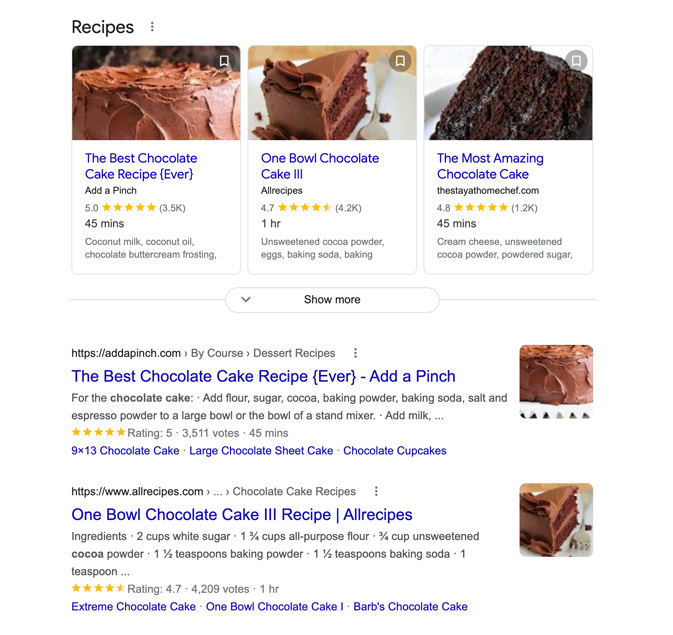What Is Schema Markup?
Schema Markup is code that you add to your website that helps search engines return more detailed information about your business. Once added, this code will create an enhanced description (a.k.a. rich snippet) of what your website is about when returned as a search result. Rich results can include carousels, images, or other non-textual elements.
This form of optimization is a highly under-utilized SEO strategy but can be a great way to stand out from your competitors. This blog will give you a brief introduction to how you can use it as a new SEO strategy.
Tell Search Engines Exactly What Your Data Means
There is no need for extra coding skills. Your website still uses HTML format to display content but the addition of schema markup tells search engines—including Google search—exactly what your data means. This common vocabulary was developed by industry experts from Google, Microsoft, Yahoo and Yandex, created with users in mind. Here is one example of what schema markup can look like in the form of a Search Engine Results Page (SERP) on Google.
This structured data can have significant impacts on your website’s SEO performance. It can improve your brand presence and potentially increase your click-through rate. These SERPs can also help make your page look more informative and engaging with snippets and images.

When To Use Schema Markup?
The benefit to using this type of structured data is being able to index content using a unique semantic vocabulary. It can return results from a search query outlining what a business is about, what they do, where they are located, etc. Here are some examples of the different types of data there is schema markup for:
- Articles
- Local businesses
- Restaurants
- TV episodes and ratings
- Book reviews
- Movies
- Software applications
- Events
- Products
- Frequently asked questions (FAQ)
Common Schema Markup Types
Organizations: This schema markup elaborates on specific details like company name, logo, contact information, location, and social profiles. Primarily used by organizations such as schools, NGOs, clubs, corporations, etc. If your business has multiple names, this schema markup type will let search engines know about that.
Person: This schema markup elaborates on an individual’s details such as name, birthdate, address, education, family members, and affiliations. Primarily used to describe a person (alive, dead, or fictional).
Local Businesses: This schema markup is used specifically for local businesses or a local brand of an organization. This helps customers easily find its location address, opening hours, menu, contact information, etc.
Recipes: This schema markup is used for recipe pages to show a recipe specific rich snippet. It can outline the title, description, prep/cook time, cooking methods, reviews, etc.
Articles: This schema markup is commonly used for news articles and blog posts to help search engines better understand what content is about.
Products & Offers: These schema markups are used to outline details of products or services. It details product information like its name, price, status, currency, and more.
Events: This schema markup provides information about events like a concert, lecture, or festival. Event details include time and location, with ticketing information being added by the offers property.
How Does Structured Data Work
There are three schema markup formats that are most common in search engines, but we are going to go over Google's recommended format:
- JSON-LD
- Microdata
- RDFa
It is not necessary to learn new code skills. Instead, use Google’s Structured Data Markup Helper to get the code for your website. Select the type of content that you want to markup and manually input the website URL and data.
JSON-LD Example

<html>
<head>
<title>Double Chocolate Cake</title>
<script type="application/ld+json">
{
"@context": "https://schema.org/",
"@type": "Recipe",
"name": "Double Chocolate Cake",
"author": {
"@type": "Person",
"name": "Theresa Gutierrez"
},
"datePublished": "2022-01-28",
"description": "If you love chocolate, you will love this decadent double chocolate cake recipe.",
"prepTime": "PT30M"
}
</script>
</head>
<body>
<h2>Double Chocolate Cake</h2>
<p>
<em>by Theresa Gutierrez, 2022-01-28</em>
</p>
<p>
If you love chocolate, you will love this decadent double chocolate cake recipe.
</p>
<p>
Preparation time: 30 minutes
</p>
</body>
</html>
More specifics on the vocabulary and structure of Schema Markup can be found in schema.org documentation.
Test Your Schema
Last but not least, it is imperative to test your code. Schema.org has a generic Schema Markup Validator to test all types of your markup. But if you would like Google-specific validation, use the Rich Results Test first. Click here to access both tools.
Need An Enterprise SEO Strategy?
We hope this blog was able to help lift some of the mystery surrounding schema markup and how your website can leverage it. Click here to learn more about acquiring more site traffic and converting leads through an enterprise SEO strategy that delivers business results.
👋 Hey Sitecore Enthusiasts!
Sign up to our bi-weekly newsletter for a bite-sized curation of valuable insight from the Sitecore community.
What’s in it for you?
- Stay up-to-date with the latest Sitecore news
- New to Sitecore? Learn tips and tricks to help you navigate this powerful tool
- Sitecore pro? Expand your skill set and discover troubleshooting tips
- Browse open careers and opportunities
- Get a chance to be featured in upcoming editions
- Learn our secret handshake
- And more!

